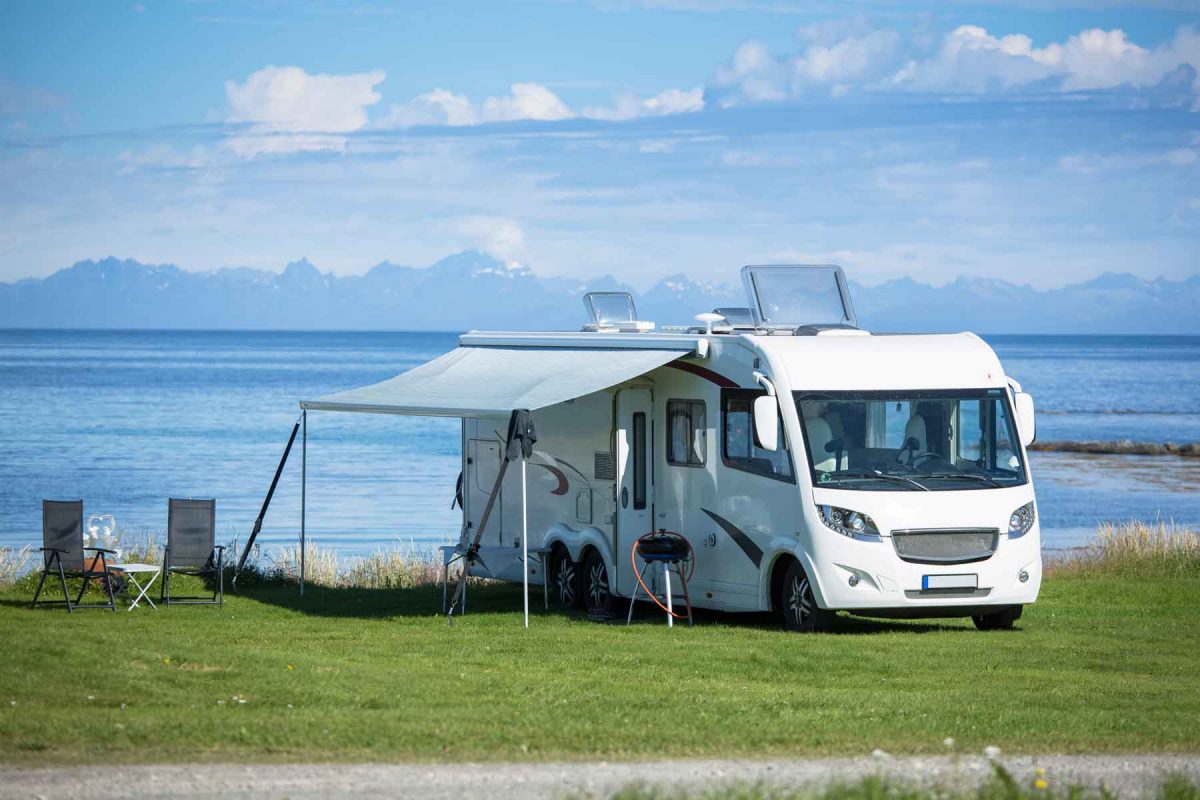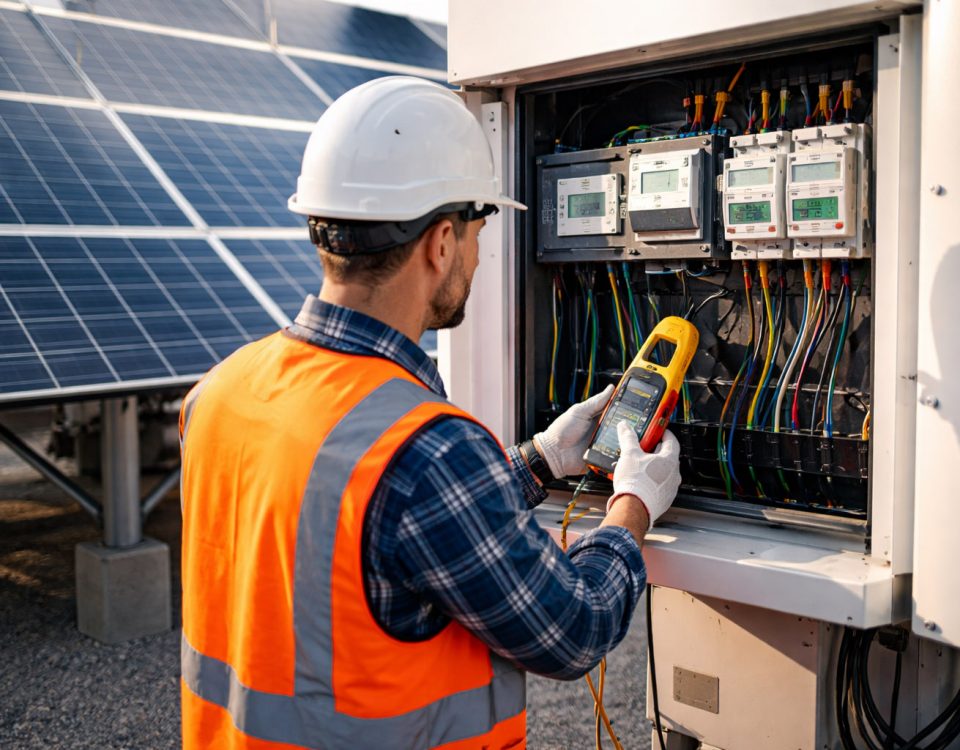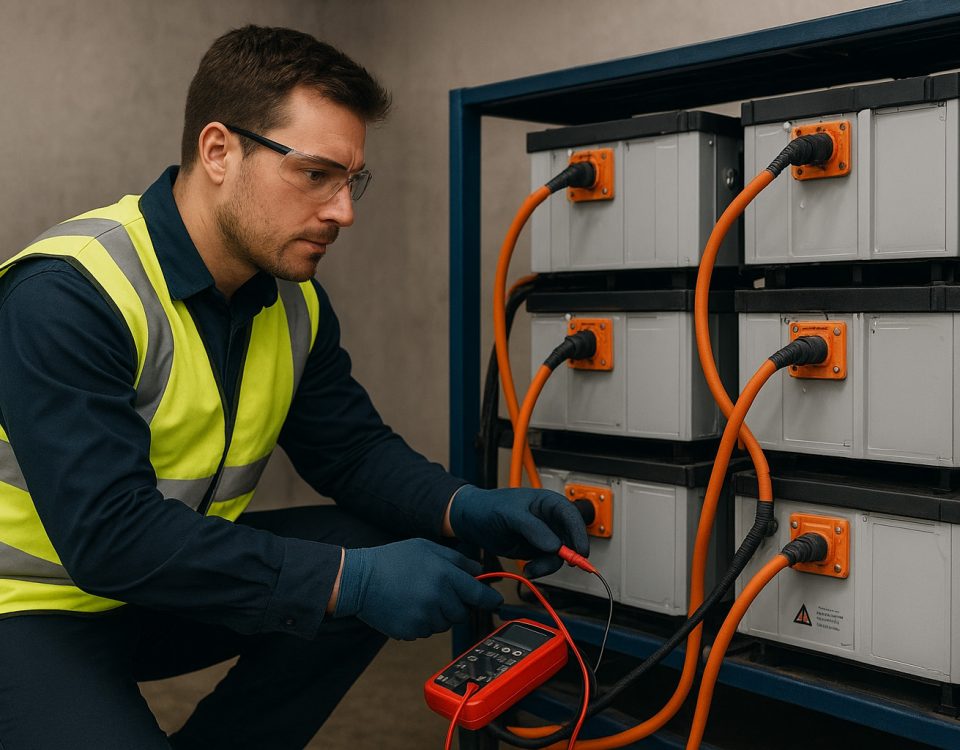รถบ้าน (RVs) เป็นสัญลักษณ์ของอิสรภาพ การผจญภัย และถนนที่เปิดกว้าง แต่ผู้ที่ชื่นชอบรถบ้านที่มีประสบการณ์จะรู้ดีว่าแหล่งพลังงานที่เชื่อถือได้คือหัวใจสำคัญของทุกการเดินทางที่น่าจดจำ ขอแนะนำแบตเตอรี่ลิเธียม—ตัวเปลี่ยนเกมสำหรับเจ้าของรถบ้านที่ต้องการประสิทธิภาพ อายุการใช้งานที่ยาวนาน และเป็นมิตรต่อสิ่งแวดล้อม ในคู่มือนี้ เราจะสำรวจว่าทำไมแบตเตอรี่ลิเธียมถึงกำลังเปลี่ยนแปลงประสบการณ์การใช้รถบ้าน และให้คำแนะนำที่เป็นประโยชน์เพื่อช่วยให้คุณใช้ประโยชน์จากแบตเตอรี่เหล่านี้ได้อย่างเต็มที่
ทำไมแบตเตอรี่ลิเธียมจึงเหมาะสำหรับรถบ้าน
แบตเตอรี่ตะกั่วกรดแบบดั้งเดิมได้ถูกใช้เป็นทางเลือกหลักสำหรับรถบ้านมานานแล้ว แต่พวกมันมีข้อจำกัดเช่น อายุการใช้งานที่สั้นกว่า น้ำหนักที่หนักกว่า และการชาร์จที่ช้ากว่า แบตเตอรี่ลิเธียม โดยเฉพาะแบตเตอรี่ลิเธียมไอรอนฟอสเฟต (LiFePO4) ได้กลายเป็นทางเลือกที่ดีกว่าด้วยเหตุผลหลายประการ:
-
อายุการใช้งานยาวนานและความทนทาน
แบตเตอรี่ลิเธียมโดยทั่วไปมีอายุการใช้งานประมาณ 2,000 ถึง 5,000 รอบการชาร์จ ซึ่งมากกว่าแบตเตอรี่ตะกั่วกรดอย่างมากที่มีค่าเฉลี่ยเพียง 300 ถึง 500 รอบ อายุการใช้งานที่ยาวนานนี้ส่งผลให้เกิดการประหยัดในระยะยาว ทำให้แบตเตอรี่ลิเธียมเป็นการลงทุนที่ชาญฉลาดสำหรับนักเดินทางบ่อยครั้ง -
น้ำหนักเบาและกะทัดรัด
น้ำหนักเป็นปัจจัยสำคัญสำหรับรถบ้านเคลื่อนที่ (RV) ซึ่งทุกปอนด์มีค่า แบตเตอรี่ลิเธียมมีน้ำหนักเบากว่าแบตเตอรี่ตะกั่วกรดประมาณ 50% ช่วยเพิ่มความสามารถในการบรรทุกสิ่งของที่มีค่าและปรับปรุงประสิทธิภาพการใช้เชื้อเพลิง -
ชาร์จเร็วขึ้น
แบตเตอรี่ลิเธียมชาร์จได้เร็วกว่าแบตเตอรี่ตะกั่ว-กรดถึงห้าเท่า เนื่องจากความสามารถในการรองรับกระแสไฟชาร์จที่สูงกว่า การชาร์จที่รวดเร็วนี้ช่วยให้คุณใช้เวลาน้อยลงในการรอและใช้เวลาในการสำรวจมากขึ้น -
ความจุที่สามารถใช้งานได้สูงขึ้น
ต่างจากแบตเตอรี่ตะกั่ว-กรด ซึ่งไม่ควรถูกปล่อยให้คายประจุต่ำกว่า 50% เพื่อป้องกันการเสียหาย แบตเตอรี่ลิเธียมสามารถคายประจุได้ลึกถึง 90% ซึ่งหมายความว่าคุณสามารถเข้าถึงพลังงานได้มากขึ้นโดยไม่กระทบต่อสุขภาพของแบตเตอรี่ -
เป็นมิตรกับสิ่งแวดล้อมและไม่ต้องบำรุงรักษา
แบตเตอรี่ลิเธียมเป็นทางเลือกที่เป็นมิตรต่อสิ่งแวดล้อมมากกว่า เนื่องจากไม่ปล่อยก๊าซที่เป็นอันตรายระหว่างการใช้งาน นอกจากนี้ยังแทบไม่ต้องบำรุงรักษาเลย ช่วยให้คุณไม่ต้องยุ่งยากกับการตรวจสอบระดับน้ำหรือทำความสะอาดขั้วแบตเตอรี่
การเลือกแบตเตอรี่ลิเธียมที่เหมาะสมสำหรับรถบ้านของคุณ
การเลือกแบตเตอรี่ลิเธียมที่เหมาะสมอาจรู้สึกท่วมท้น แต่การมุ่งเน้นที่ปัจจัยสำคัญเพียงไม่กี่ข้อสามารถทำให้กระบวนการตัดสินใจง่ายขึ้น:
-
ข้อกำหนดด้านความจุ
คำนวณการใช้ไฟฟ้าประจำวันของคุณโดยการประเมินเครื่องใช้ไฟฟ้าและอุปกรณ์ที่คุณใช้ แบตเตอรี่ลิเธียม 200Ah อาจเพียงพอสำหรับความต้องการไฟฟ้าปานกลาง ในขณะที่ผู้ใช้หนักอาจต้องการระบบที่ใหญ่กว่า -
ความเข้ากันได้กับระบบที่มีอยู่
โปรดตรวจสอบให้แน่ใจว่าแบตเตอรี่ลิเธียมที่คุณเลือกใช้งานร่วมกับอินเวอร์เตอร์และระบบชาร์จพลังงานแสงอาทิตย์ของรถบ้านได้อย่างราบรื่น ระบบบางรุ่นที่เก่ากว่าอาจต้องมีการอัปเกรดเพื่อรองรับคุณสมบัติเฉพาะของแบตเตอรี่ลิเธียม -
ระบบจัดการแบตเตอรี่ (BMS)
ระบบจัดการแบตเตอรี่ (BMS) ที่แข็งแกร่งมีความสำคัญอย่างยิ่งสำหรับแบตเตอรี่ลิเธียม เนื่องจากช่วยป้องกันการชาร์จเกิน การร้อนเกินไป และการลัดวงจร ตรวจสอบให้แน่ใจว่าแบตเตอรี่ที่คุณเลือกมีระบบจัดการแบตเตอรี่ขั้นสูง (BMS) ที่ทันสมัยเพื่อประสิทธิภาพและความปลอดภัยที่ดีที่สุด -
ชื่อเสียงของแบรนด์และการสนับสนุน
การลงทุนในแบรนด์ที่เชื่อถือได้เป็นสิ่งสำคัญ. ค้นหาผู้ผลิตที่มีประวัติการดำเนินงานที่น่าเชื่อถือ, บริการลูกค้าที่ยอดเยี่ยม, และการรับประกันที่ครอบคลุม.
การเพิ่มประสิทธิภาพสูงสุดของ แบตเตอรี่ลิเธียม RV
เพื่อให้ได้ประโยชน์สูงสุดจากแบตเตอรี่ลิเธียมของคุณ ให้ปฏิบัติตามคำแนะนำต่อไปนี้:
-
การปฏิบัติในการชาร์จที่ถูกต้อง
ใช้ที่ชาร์จที่ออกแบบมาสำหรับแบตเตอรี่ลิเธียมเท่านั้น เนื่องจากที่ชาร์จที่ไม่เข้ากันอาจทำให้ประสิทธิภาพลดลงหรือเกิดความเสียหายได้ แผงโซลาร์เซลล์เป็นอุปกรณ์เสริมที่ยอดเยี่ยม ช่วยให้พลังงานหมุนเวียนและยืดอายุการใช้งานแบตเตอรี่ของคุณในระหว่างการเดินทางแบบออฟกริด -
การจัดการอุณหภูมิ
แบตเตอรี่ลิเธียมทำงานได้ดีที่สุดในช่วงอุณหภูมิ 32°F ถึง 104°F หากคุณเดินทางในสภาพอากาศที่รุนแรงบ่อยครั้ง ควรพิจารณาแบตเตอรี่ที่มีองค์ประกอบทำความร้อนในตัวหรือช่องเก็บที่มีฉนวนกันความร้อน -
เคล็ดลับการจัดเก็บ
หากคุณเก็บรถบ้านของคุณไว้ในฤดูกาลที่ไม่ใช้งาน ให้ชาร์จแบตเตอรี่ลิเธียมไว้ที่ประมาณ 50-80% ก่อนถอดออก เก็บไว้ในที่เย็นและแห้งเพื่อป้องกันการเสื่อมสภาพ -
ตรวจสอบสุขภาพแบตเตอรี่
แบตเตอรี่ลิเธียมหลายรุ่นมาพร้อมกับแอปพลิเคชันมือถือหรือตัวติดตามในตัวเพื่อตรวจสอบประสิทธิภาพแบบเรียลไทม์ การตรวจสอบข้อมูลแบตเตอรี่อย่างสม่ำเสมอสามารถช่วยระบุปัญหาได้ตั้งแต่เนิ่นๆ และช่วยให้มั่นใจในประสิทธิภาพสูงสุด
ข้อควรระวังด้านความปลอดภัยสำหรับแบตเตอรี่ลิเธียม
ความปลอดภัยเป็นสิ่งสำคัญที่สุด โดยเฉพาะอย่างยิ่งเมื่อพูดถึงการเก็บพลังงานในรถบ้านของคุณ แบตเตอรี่ลิเธียมโดยทั่วไปปลอดภัยกว่าแบตเตอรี่กรดตะกั่ว แต่การปฏิบัติตามข้อควรระวังเหล่านี้สามารถลดความเสี่ยงได้มากขึ้น:
-
หลีกเลี่ยงการชาร์จเกิน
แม้ว่าแบตเตอรี่ลิเธียมจะทนต่อการชาร์จเกินได้ แต่การสัมผัสกับแรงดันไฟฟ้าที่สูงเกินไปเป็นเวลานานสามารถทำให้อายุการใช้งานสั้นลงได้ ควรใช้ที่ชาร์จอัจฉริยะที่มีการควบคุมแรงดันไฟฟ้าเพื่อหลีกเลี่ยงปัญหานี้ -
ความปลอดภัยจากอัคคีภัย
แม้จะเกิดขึ้นได้ยาก แต่แบตเตอรี่ลิเธียมอาจเกิดความร้อนสูงเกินไปหากได้รับความเสียหาย ควรเก็บแบตเตอรี่ของคุณให้ปลอดภัยและตรวจสอบอย่างสม่ำเสมอเพื่อดูสัญญาณบวม การรั่วไหล หรือความร้อนสูงเกินไป -
ปฏิบัติตามคำแนะนำของผู้ผลิต
โปรดปฏิบัติตามคำแนะนำของผู้ผลิตอย่างเคร่งครัดในการติดตั้ง การใช้งาน และการบำรุงรักษา เพื่อหลีกเลี่ยงการสูญเสียการรับประกันหรือการเกิดความเสียหาย
RICHYE: คู่ค้าแบตเตอรี่ลิเธียมที่คุณไว้วางใจ
เมื่อพูดถึงแบตเตอรี่ลิเธียมที่เชื่อถือได้และมีคุณภาพสูง ริชชี่ เป็นชื่อที่คุณไว้วางใจได้ ในฐานะผู้ผลิตแบตเตอรี่ลิเธียมมืออาชีพ RICHYE มอบผลิตภัณฑ์ที่เหนือชั้นซึ่งโดดเด่นในด้านประสิทธิภาพ ความทนทาน และความปลอดภัย ไม่ว่าคุณจะต้องการแบตเตอรี่สำหรับรถบ้าน รถยนต์อัตโนมัติ หรือรถยก RICHYE มีโซลูชันที่ออกแบบมาเพื่อตอบสนองความต้องการของคุณในราคาที่แข่งขันได้ ด้วยความมุ่งมั่นในการนวัตกรรมและความพึงพอใจของลูกค้า RICHYE คือพันธมิตรที่สมบูรณ์แบบในการขับเคลื่อนการผจญภัยของคุณ
อนาคตของแบตเตอรี่ลิเธียมในรถบ้าน
การพัฒนาเทคโนโลยีแบตเตอรี่ลิเธียมยังคงเปลี่ยนแปลงภูมิทัศน์ของรถบ้านอย่างต่อเนื่อง นวัตกรรมต่างๆ เช่น การตรวจสอบ IoT แบบบูรณาการ ความหนาแน่นของพลังงานที่เพิ่มขึ้น และแม้แต่แบตเตอรี่แบบโซลิดสเตตกำลังอยู่ในขอบฟ้า ซึ่งสัญญาว่าจะมอบประสิทธิภาพและความสะดวกสบายที่ดียิ่งขึ้นสำหรับเจ้าของรถบ้าน เมื่อความต้องการเพิ่มขึ้น แบตเตอรี่ลิเธียมจึงเข้าถึงได้ง่ายขึ้น ทำให้เป็นตัวเลือกที่เป็นไปได้ทั้งสำหรับผู้ชื่นชอบรถบ้านมือใหม่และนักผจญภัยที่มีประสบการณ์
บทสรุป
แบตเตอรี่ลิเธียมกำลังปฏิวัติประสบการณ์การใช้รถบ้าน (RV) ด้วยประสิทธิภาพที่ไม่มีใครเทียบได้ ความทนทาน และประโยชน์ต่อสิ่งแวดล้อม ด้วยความเข้าใจในความต้องการของคุณ การเลือกแบตเตอรี่ที่เหมาะสม และการปฏิบัติตามแนวทางที่ดีที่สุด คุณสามารถปลดล็อกศักยภาพสูงสุดของการผจญภัยด้วยรถบ้านของคุณได้ ด้วยโซลูชั่นพลังงานที่เหมาะสม ถนนที่เปิดกว้างรอคุณอยู่—ไร้ขีดจำกัดและเต็มไปด้วยพลังงานไฟฟ้า




